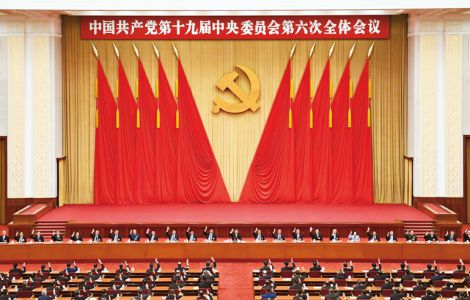中英对照:中共中央关于党的百年奋斗重大成就和历史经验的决议 [7]
Resolution of the Central Committee of the Communist Party of China on the Major Achievements and Historical Experience of the Party over the Past Century [7]
党领导全面开展思想、政治、组织等领域拨乱反正,大规模平反冤假错案和调整社会关系。党制定《关于建国以来党的若干历史问题的决议》,标志着党在指导思想上的拨乱反正胜利完成。
The Party restored and formulated a series of correct policies in all fields of work, and began the process of readjusting the national economy. Under the leadership of the Party, comprehensive steps were taken to set things right ideologically, politically, and organizationally, and extensive efforts were made to redress wrongs suffered by those who were unjustly, falsely, and wrongly accused and to regulate social relations. The adoption of the Resolution on Certain Questions in the History of Our Party since the Founding of the People’s Republic of China marked the successful conclusion of the Party’s efforts to rectify its guiding principles.
党深刻认识到,开创改革开放和社会主义现代化建设新局面,必须以理论创新引领事业发展。邓小平同志指出,一个党,一个国家,一个民族,如果一切从本本出发,思想僵化,迷信盛行,那它就不能前进,它的生机就停止了,就要亡党亡国。党领导和支持开展真理标准问题大讨论,从新的实践和时代特征出发坚持和发展马克思主义,科学回答了建设中国特色社会主义的发展道路、发展阶段、根本任务、发展动力、发展战略、政治保证、祖国统一、外交和国际战略、领导力量和依靠力量等一系列基本问题,形成中国特色社会主义理论体系,实现了马克思主义中国化新的飞跃。
The Party came to recognize that to open up new prospects for reform, opening up, and socialist modernization, it needed to steer the advancement of its endeavors with theoretical innovation. Comrade Deng Xiaoping once said, “When everything has to be done by the book, when thinking turns rigid and blind faith is the fashion, it is impossible for a party or a nation to make progress. Its life will cease and that party or nation will perish.” With this understanding, the Party led and supported extensive discussions on the criterion for testing truth, upheld and developed Marxism in light of new practices and the features of the times, and effectively answered a series of basic questions regarding socialism with Chinese characteristics, including development path, stage of development, fundamental tasks, development drivers, development strategies, political guarantee, national reunification, diplomacy and international strategy, leadership, and forces to rely on, thereby forming the theory of socialism with Chinese characteristics and achieving a new breakthrough in adapting Marxism to the Chinese context.
党的十二大、十三大、十四大、十五大、十六大、十七大,根据国际国内形势发展变化,从我国发展新要求出发,一以贯之对推进改革开放和社会主义现代化建设作出全面部署,并召开多次中央全会专题研究部署改革发展稳定重大工作。
At its 12th through 17th national congresses, the Party made consistent overall plans for advancing reform, opening up, and socialist modernization in view of evolving circumstances at home and abroad and new requirements for the country’s development. The Central Committee convened several plenary sessions dedicated to planning major initiatives for promoting reform, development, and stability.
我国改革从农村实行家庭联产承包责任制率先突破,逐步转向城市经济体制改革并全面铺开,确立社会主义市场经济的改革方向,更大程度更广范围发挥市场在资源配置中的基础性作用,坚持和完善基本经济制度和分配制度。党坚决推进经济体制改革,同时进行政治、文化、社会等各领域体制改革,推进党的建设制度改革,不断形成和发展符合当代中国国情、充满生机活力的体制机制。
The introduction of the household contract responsibility system in rural areas marked the initial breakthrough in China’s reform, further steps were gradually taken to reform the economic structure in the cities, and reform initiatives were then carried out across the board. Oriented toward the development of a socialist market economy, this reform gave greater and broader play to the basic role of market in allocating resources, while upholding and improving China’s basic economic and income distribution systems. While resolutely advancing economic structural reform, the Party simultaneously carried out political, cultural, and social structural reforms as well as institutional reforms related to Party building, which led to the formation and development of vigorous institutions and mechanisms that suited the conditions of contemporary China.
党把对外开放确立为基本国策,从兴办深圳等经济特区、开发开放浦东、推动沿海沿边沿江沿线和内陆中心城市对外开放到加入世界贸易组织,从“引进来”到“走出去”,充分利用国际国内两个市场、两种资源。
The Party designated opening up as a fundamental national policy. Under this policy, China progressed from establishing special economic zones in Shenzhen and a few other areas to opening up more parts of the country–Pudong in Shanghai, key inland cities as well as areas along the coastline, borders, the Yangtze River, and major transportation routes. It also acceded to the World Trade Organization, and went from “bringing in” to “going global.” In this process, we fully utilized both domestic and international markets and resources.
经过持续推进改革开放,我国实现了从高度集中的计划经济体制到充满活力的社会主义市场经济体制、从封闭半封闭到全方位开放的历史性转变。
With continuous progress in reform and opening up, China achieved the historic transformations from a highly centralized planned economy into a socialist market economy brimming with vitality, and from a country that was largely isolated into one that is open to the outside world across the board.
为了加快推进社会主义现代化,党领导人民进行经济建设、政治建设、文化建设、社会建设,取得一系列重大成就。
In an effort to accelerate socialist modernization, the Party led the people in promoting economic, political, cultural, and social development and made immense achievements.
党坚持以经济建设为中心,坚持发展是硬道理,提出科学技术是第一生产力,实施科教兴国、可持续发展、人才强国等重大战略,推进西部大开发,振兴东北地区等老工业基地,促进中部地区崛起,支持东部地区率先发展,促进城乡、区域协调发展,推进国有企业改革和发展,鼓励和支持发展非公有制经济,加快转变经济发展方式,加强生态环境保护,推动经济持续快速发展,综合国力大幅提升。
The Party continued to take economic development as the central task, stood by the conviction that development is of paramount importance, and put forward the notion that science and technology constitute the primary productive force. It implemented major strategies such as invigorating China through science and education, pursuing sustainable development, and developing a quality workforce. It advanced large-scale development of the western region, revitalized old industrial bases in the northeast and other regions, promoted the rise of the central region, and supported the trailblazing development of the eastern region in an effort to promote the coordinated development of urban and rural areas and different regions. The Party promoted the reform and development of state-owned enterprises, encouraged and supported the development of the non-public sector, and accelerated the transformation of the economic growth model. It stepped up environmental protection and promoted sustained and rapid economic development. All of this enabled China’s composite national strength to increase by a large margin.
党坚持党的领导、人民当家作主、依法治国有机统一,发展社会主义民主政治,建设社会主义政治文明,积极稳妥推进政治体制改革,坚持依法治国和以德治国相结合,制定新宪法,建设社会主义法治国家,形成中国特色社会主义法律体系,尊重和保障人权,巩固和发展最广泛的爱国统一战线。
Upholding the unity between the Party’s leadership, the running of the country by the people, and law-based governance, the Party worked to develop socialist democracy and promote socialist political progress and advanced reform of the political system in a proactive and prudent manner. With a commitment to integrating the rule of law with the rule of virtue, a new Constitution of the People’s Republic of China was formulated, China built itself into a socialist country under the rule of law, and a socialist system of laws with Chinese characteristics took shape. The Party made earnest efforts to respect and protect human rights and consolidated and developed the broadest possible patriotic united front.
党加强理想信念教育,推进社会主义核心价值体系建设,建设社会主义精神文明,发展社会主义先进文化,推动社会主义文化大发展大繁荣。
The Party stepped up education on ideals and convictions, advanced the development of the core socialist values, promoted cultural-ethical progress, and fostered an advanced socialist culture, thus pushing socialist culture to flourish.
注:为确保中英对照准确,“热词译”网站可能对中英文重新分段。

